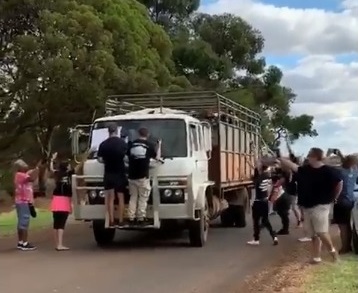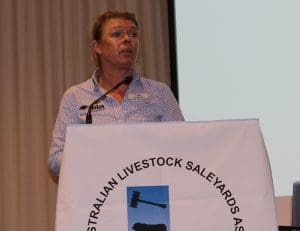
Activists targeting a livestock truck. Source – Perth Vegans Facebook.
AUSTRALIA’S livestock carriers want proposed federal agricultural protection trespass laws extended to protect them against animal activist attacks.
At the Australian Livestock Saleyards Association conference last week, vice president of the Livestock Road Transport Association of Victoria John Beer put the case for greater protection and support for livestock carriers.
He said carriers were being put under stress by activists targeting their trucks while transporting and delivering livestock.
His call came as an Australian Livestock Road Transport Association submission to include an additional offence protecting carriers in the federal Criminal Code Amendment (Agricultural Protection) Bill 2019 is being considered by a Senate Legal and Constitutional Affairs Committee.
The ALRTA wants inclusion of an offence that would apply ‘where a person uses a carriage service to transmit, make available, publish or otherwise distribute material with the intent to incite another person to unlawfully impede, interfere, harass, damage, deface etc a heavy vehicle engaged in moving goods to agricultural land or from agricultural land.’
ALTRA executive director Mathew Munro said the association had many examples across three states of activists blocking trucks, verbally harassing and inciting drivers to get out of the vehicle “to take the matter further.” Activists have also tried to steal ignition keys, climb on bull bars and crates, and photograph or give water to livestock in truck crates. He said activist actions delaying livestock carrier supplying processors could also impact on the welfare of the animal’s being delivered.
Mr Munro said the offices of Minister for Road Safety Scott Buccholz and Minister for Agriculture Bridget McKenzie were sympathetic to ALRTA’s cause and understood its reasons for wanting to extend the legislation’s coverage to carriers.
Farm trucks have also been harassed by activists and the National Farmers Federation supports the ALRTA submission for the Bill to also apply to heavy vehicles moving goods to or from agricultural land. The federation said there are multiple examples where activists have targeted trucks attempting to enter or leave agricultural land, putting themselves and others at risk of injury, damaging property and disrupting lawful activity.
Mr Munro said ALRTA supported the Bill in its current form, but is concerned if it passes without being enhanced to protect carriers, trucks might become more of a target due to the higher penalties for activist activities at other points in the supply chain.
“Under chain of responsibility, if a driver commits an offence then other people in the chain are seen to have committed offences as well.
“A driver is subject to things like fatigue legislation, which only permits them to drive for a certain amount of time,” he said.
“You could imagine if you were running pretty close to schedule and you got blockaded by protesters for 20-30 minutes there is a good chance you might run over time with your own fatigue…
Livestock carriers need more protection than staying calm

MLA community engagement manager Jax Baptista
At the ALSA conference, Mr Beer challenged the advice of Meat & Livestock Australia’s community engagement manager Jax Baptista who said she was aware saleyards and livestock carriers were extremely vulnerable to animal activist protests.
She outlined an incident in Queensland where a farm owner stayed calm and was respectful toward trespassing activists, and waited for police to arrive.
“The lesson learnt here is don’t get the shotgun, don’t threaten people, don’t get angry.
“Take it in your stride, it is a horrible thing to have to suck up, but it sort of has to be sucked up; you can’t afford to create more angst, because all it is doing is creating the argy-bargy,” she said.
“We’re taking the aggression out, we’re taking their story away – let’s take the story away.”
Ms Baptista advised participants not to engage with activists and to “walk away, because all you are doing is giving them oxygen every time someone gets angry – let’s stop giving them oxygen.”

Livestock transporter John Beer, left, with Frank Belcec at the Australian Livestock Saleyards Association conference.
Mr Beer said he liked Ms Baptista’s advice to stay calm, “but we are at the coal face and you’re not.”
“It is alright to stay calm, but I’ve got drivers now that are stressed, it probably borders on a mental health issue, to know that they’ve even got to go into Diamond Valley Pork at Laverton and get stood down (delayed).
“I still do a bit of driving and I’ve been stood down for about three hours on side the road waiting,” he said.
“So, if that’s not stress, stay calm, I think you are on the wrong channel a little bit, because that is the coalface, whether you like it or not, that’s what’s happening out there,” he said.
“How do you stay calm in 70 degree heat in a big truck stopped on the side of the road?
Ms Baptista said there would be ways to work with drivers to reduce stress in activist protest situations.
Mr Beer later questioned why the responsibility for the welfare of livestock in transit and to be calm in the face of activist protests was being transferred to truck drivers.
“The younger drivers are getting affected as far as mental health – it does worry you.”
He said activist activities in targeting livestock trucks was placing the safety and welfare of livestock, drivers and other road users at risk, and laws need to be extended to cover this.
Other issues discussed at the conference included the lack of truck washes and effluent disposal sites for carriers, despite chain of responsibility rules requiring carriers to contain livestock waste.

HAVE YOUR SAY